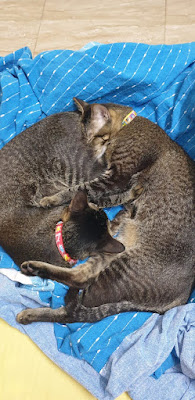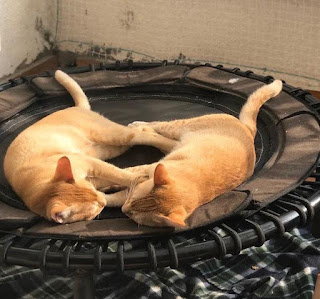I’ve been convinced for a while now that cats and kittens
are better adopted in pairs and it was my own experience that convinced me of
this. When I adopted Totem, I had thought of eventually getting a companion for
him, but kept putting it off because I felt I was not ready. That I would be
unable to handle two cats on my own, that two cats are too much work.
Fate pretty much took that choice away from me and I couldn’t
be happier about it.
JJ came to me as a foster, and I was very keen to get him
adopted. I even had an adopter finalized. But slowly I noticed some changes in
Totem. He used to be cranky and super needy, very vocal and restless. He had
gone from being a street cat to a house cat who was staying alone at home for 8-9
hours. And when I’d be back home, it’s not like I could spend all my time with
him. We’d have dedicated play sessions but I could see he wasn’t happy.
Along came JJ and bonded with Totem like a match made in heaven.
Totem mothered him and he kept Totem busy. They would play and eat and cuddle
together. JJ was actually brought up by Totem, not me. He was terrified of
people when he was rescued. Totem was much calmer, much less needy and cranky.
I STILL wanted to proceed with the adoption. I had this mental
block that two cats are too much for one working person. Luckily for me, the adopter
dropped out at the last minute. I took a day to think and it hit me that Totem needs
JJ and JJ is home already. The clincher for me – I’d had JJ for a whole month
and I felt ZERO extra effort or stress. In fact, my life was easier.
 |
They’re best buds to date. When I leave them at a friend’s
place when I travel, they are each other’s comfort. They play, they fight, they
cuddle and sleep. They give each other a certain kind of companionship I cannot.
Two kittens are better than one because they lead more enriched lives.
Two kittens are better than one because they lead more enriched lives.
Here’s how:
- Companionship: Contrary to popular belief, cats are not solitary creatures. A kitty companion keeps them much happier and provides emotional support.
- Play buddies: Cats do sleep a lot, but they also love playing. Us humans playing with them isn’t always enough to burn off all their energy. A kitten playmate is perfect for that.
- Fewer behavioral issues: Single cats often have behavioral issues due to loneliness and boredom, like Totem did. They can be excessively vocal, urinate randomly, be restless and cranky, be aggressive or just be completely listless and dull. A companion can really help with these kinds of issues because they offer mental stimulation and will keep each other busy. Single kittens also can have play aggression or have a destructive streak for which a feline companion is a great outlet.
- Comfort factor: When two cats bond, or if they’re adopted already as a bonded pair, they bring each other a sense of safety and comfort, which a human cannot, no matter how hard you try.
- Self-train: Cats pick up behaviors from each other, so what one cat learns, the other one picks up. There is increased learning which leads to better lives for them and for us. JJ teaches my foster kittens so much that I will never be able to.
- Healthier cats: Cats in pairs are healthier because they keep each other physically active and exercised. There is less likelihood of them becoming overweight. They also provide each other comfort and safety, thereby reducing stress. They groom each other, which helps keep them clean and relaxes them. Often kittens will groom each other as a sign of protection and affection. It’s difficult for cats to reach their own faces and ears, so they may rely on the other cats in their home to keep these areas tidy.
- It’s a lot of fun: Two kittens are great fun, much more so than a single kitten. Their antics and play and cuddling and grooming are all so darn cute!
- Twice the love for a little extra effort and cost: There will be some increased expenses for a second cat - mainly food, litter, vaccinations, and spay/neuter. A lot of other things can be common and shared - toys, cat trees, cat beds. Costs for kitten proofing remain the same too. “More effort” is a technicality in my opinion, instead of filling one bowl of food you fill two, and instead of cleaning one litter box you clean two. Things like vet visits do get a bit more complex.
- Lesser pressure on working pet parents: If you’re someone who works a 9-10 hour job and then has to come back home and work some more, maintain the house, have social engagements – a second kitten will lessen the pressure on you to be present for your cat all the time.
- You'll save two lives instead of one: Lots and lots of kittens die on the streets. If you can make a little space in your homes and hearts for one more, and reap a ton of benefits, it’s just win-win, isn’t it?
Often adopters tell us that they would prefer adopting a single kitten first and once they can handle him/her, they will come back to adopt a companion as they are of the opinion that two kittens mean more work. As discussed above, this may not be the best idea as a single kitten by itself is often more difficult to keep entertained than a pair who can keep each other occupied.
It is always a better idea to adopt two bonded kittens from a litter rather than separate the kittens, allow the cat to grow in isolation for a few months/years and then attempt to introduce/socialize them with a totally new kitten/ cat.
While it is quite possible to socialize an existing pet with a newcomer, it is added work on your part as socializations need to be carefully facilitated and monitored.
As the Kitten Lady says, One Kitten is Half a Kitten. Two Kittens Are a Whole!
An important note:
There can be some exceptional cases of cats who actually do better
alone, like my parents’ cat Midnight. It’s in her nature. She and our other cat
Pepper were rescued at the same time and grew up together but never bonded.
They merely tolerated each other and wouldn’t have any other cat or kitten
around. If your cat is one of those, then please don’t force a companion on
them. These kinds of situations are quite rare in my experience.
Still not convinced?
Here are some real-life stories. I’ve been fostering for years now and out of the around 50+ adoptions I’ve been involved in more than 90% were either pair adoptions or were adopted as a companion for another cat. And not once has an adopter come back to me saying having two cats is not working out. See for yourself!
Here are some real-life stories. I’ve been fostering for years now and out of the around 50+ adoptions I’ve been involved in more than 90% were either pair adoptions or were adopted as a companion for another cat. And not once has an adopter come back to me saying having two cats is not working out. See for yourself!
Maple was adopted with Ollie (by adopters keen on a pair adoption) but unfortunately, Ollie developed some health issues and had to go back to his foster, where it was determined that he needs to be an only cat. But Maple was really missing having a companion, and when his family recognized this, they adopted Tara who is now BFF with Maple!
Thor Casper Went through a very difficult time when they tested positive for feline panleukopenia or parvo. Being with each other through the illness and treatment visibly helped them both.
Thor Casper Went through a very difficult time when they tested positive for feline panleukopenia or parvo. Being with each other through the illness and treatment visibly helped them both.
Quasar was rescued as a single kitten. His parent found it difficult to keep up with his high energy and felt he needed company. They adopted Darcy from me, another single looking for a home and the duo became BFFs and did everything together. Due to unfortunate circumstances, Quasar went missing. Darcy really missed his brother and became needy & upset. His parents made the decision to adopt another rescued kitten Cleo, who restored Darcy to his cheerful, happy self.
Amber and Jasper were part of a litter of 4 kittens who were rescued when their mom died, leaving them orphaned at 3 weeks old. Over the course of their time in foster care, we mom noticed that Amber and Jasper did everything together and preferred each other's company. They were thus adopted together and have been best friends since.
Ginny was adopted as a companion to adult cat Kishmish, when her humans felt she would benefit greatly with a sister around. They went on to adopt another visually challenged kitten, and they are now an adorable trio.
Luna was adopted from us as an only kitten. But soon enough her humans felt the need for her to have a companion. Here's a much happier Luna with her new brother Coco!
Jack and Jones were rescued separately but bonded when they were fostered together. When their adopter came to meet them, she instantly recognized their bond and agreed to adopt both. Their mom went on to rescue June soon after, and now this trio is bonded for life.
Misha's adopter got back to me 9 months after she adopted Misha, that she felt the need for Misha to have a companion. She then adopted Talia and the sisters are now much happier!
Tashi and Sangria had a rough start to life. Their first adopter decided to abandon them after 6 months. We took them back and decided to adopt them out only as a pair, as the abandonment had caused them trauma and their bond really helped them deal with it. Lucky for us, a wonderful family understood the need for them to stay together, and look at them now!
Yushi and Keiko were rescued when they were chased by dogs and their trauma was so deep that Yushi never left Keiko's side for weeks after. It was only logical to adopt them out together. They were also a great source of comfort to each other when their human moved to a different city and they had to travel and adjust to a new place.
I can share a dozen more such personal stories, but I think I've made my point here, even if I did share too many pics 😬.
So go get your kitten pair today, or if you have a single cat, think what's best for them.
So go get your kitten pair today, or if you have a single cat, think what's best for them.














Comments
Post a Comment